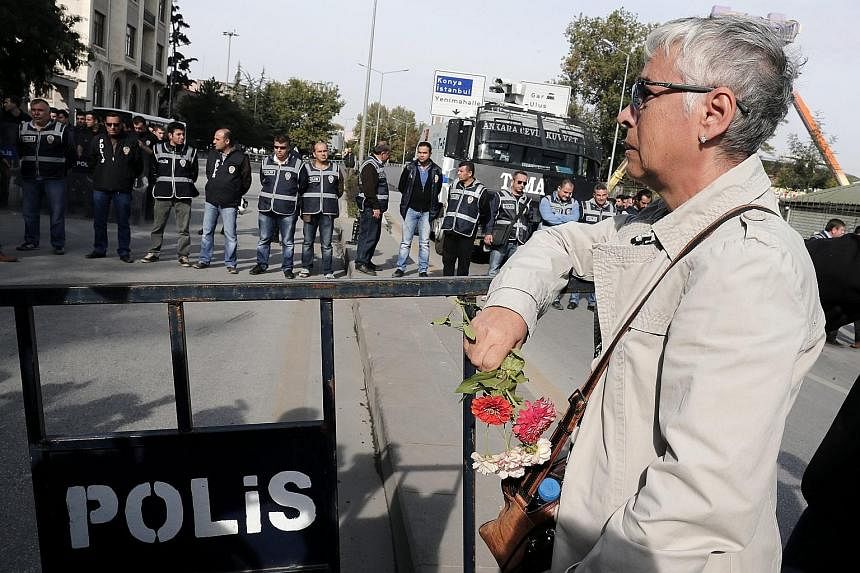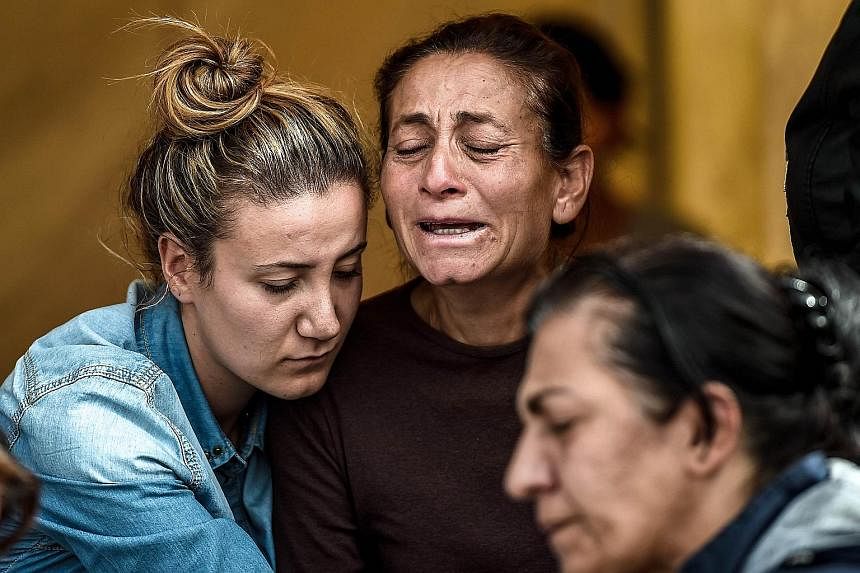ANKARA • With international concern growing over instability in Turkey, which suffered its worst terrorist attack at the weekend, United States President Barack Obama offered his condolences to President Recep Tayyip Erdogan and solidarity "in the fight against terrorism", the White House said.
Mr Obama's message came as at least 95 people were confirmed killed in twin suspected suicide bombings on a peace rally in Ankara.
China also strongly condemned the bombings in the Turkish capital. "We are against terrorist attacks in any form," Chinese Foreign Ministry spokesman Hua Chunying said in a statement yesterday.
United Nations Secretary-General Ban Ki Moon condemned the bombings, and extended condolences to the families of the victims.
European Union foreign policy chief Federica Mogherini urged Turkey, a key Nato member, to "stand united against terrorists", while Pope Francis said he was deeply saddened by the killing.
The attacks shocked Ankara, which became the capital in 1923 following the founding of the modern Turkish Republic by Mustafa Kemal Ataturk.
"This could well be Turkey's 9/11," said Mr Soner Cagaptay, director of the Turkish Research Programme at The Washington Institute, referring to the Sept 11, 2001, terror attacks by Al-Qaeda in the US.
"It took place in the heart of the Turkish capital, across from the city's central train station, a symbolic landmark of Ataturk's Ankara, as well as killing so many people," he told Agence France-Presse.
The attack brought Turkey's political and ethnic tensions, exacerbated by the civil war in neighbouring Syria, to a grim new level. No one immediately claimed responsibility for the deadliest terrorist attacks in Turkey's recent history, though suspicion quickly turned to the Islamic State in Iraq and Syria (ISIS).
Initial indications suggest ISIS was responsible, and investigations are focusing on the extremist group, two senior Turkish security sources told Reuters yesterday.
The carnage in Ankara came as US-allied Kurdish forces affiliated with the militant Kurdistan Workers' Party, or PKK, were preparing to advance towards ISIS' self-declared capital of Raqqa in Syria, according to Mr Nihat Ali Ozcan, who studies the Kurdish conflict at the Economic Policy Research Foundation in Ankara.
"Daesh struck at the PKK in Ankara before a Kurdish offensive on Raqqa," Mr Ozcan said by phone, using the Arabic acronym for ISIS.
"Turkey has become the battleground in a growing war between the PKK and Daesh."
But even though many Kurds were in the targeted crowd, Interim Prime Minister Ahmet Davutoglu maintained in a televised news conference that the PKK, and not only ISIS, may be behind the bloodshed.
"There are strong signs that the attack has been carried out by two suicide bombers," Mr Davutoglu said, adding that Turkey has apprehended many would-be suicide bombers in recent days.
The blasts targeted a march called to urge an end to violence between the government and Kurdish militants. In the wake of the attack, Kurdish fighters declared a unilateral ceasefire, which they said they would honour as long as they are not attacked.
But Turkish warplanes struck PKK targets in northern Iraq and south-eastern Turkey on Saturday and yesterday.
Security sources said some 30 to 35 PKK guerrillas were killed in northern Iraqi raids yesterday.
"The PKK ceasefire means nothing for us. The operations will continue without a break," one senior security official said.
The increased violence and political uncertainty have battered markets while raising fears that Turkey is being increasingly dragged into the civil war in Syria.
AGENCE FRANCE-PRESSE, REUTERS, BLOOMBERG


